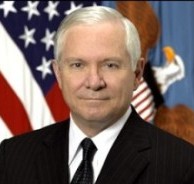ROUNDUP: Gates announces broad shift in US defence priorities
 Washington - US Defence Secretary Robert Gates on Monday laid out a major shift in the Pentagon's spending priorities, cutting a range of expensive Cold War-era weapons programmes and boosting capabilities that would aid the country's battle against terrorism.
Washington - US Defence Secretary Robert Gates on Monday laid out a major shift in the Pentagon's spending priorities, cutting a range of expensive Cold War-era weapons programmes and boosting capabilities that would aid the country's battle against terrorism.
Gates said the decisions drew heavily on lessons learned from the wars in Iraq and Afghanistan and represented a shift away from conventional warfare, as well as futuristic military projects where the technology was not yet proven.
The 2010 budget outline would "profoundly reform how this department does business," Gates said at a news conference in Washington, also promising to limit cost-overruns that have cost the defence community billions of dollars.
"These recommendations are the product of a holistic assessment of capabilities, requirements, risks and needs for the purpose of shifting this department in a different strategic direction," Gates said.
Gates proposed slashing 1.4 billion dollars from the US missile defence programme, cutting an 11.3-billion-dollar plan for new helicopters for the president and axing a plan to buy advanced F-22 fighter jets that cost some 140 million dollars apiece.
In contrast, Gates proposed an 11-billion-dollar increase in troop recruitment efforts, more money for helicopters in Afghanistan and training of foreign forces in counter-insurgency efforts. The military would also get 50 new unmanned Reaper and Predator drones used to strike militants in Pakistan, Afghanistan and Iraq.
Gates' unveiling marks only the first step in a budget process that is likely to face stiff resistance from US lawmakers. The budget outline now goes to President Barack Obama, who will then send the plans to the US Congress.
The fight in Congress will be especially difficult as the United States goes through its worst recession in decades. Many weapons programmes to be axed are built in congressional districts whose representatives hope to prevent manufacturing jobs from being lost.
"The buck stops with Congress, which has critical constitutional responsibility to decide whether to support these proposals," Ike Skelton, the Democratic chairman of the House of Representatives Armed Services Committee, said in a statement.
On missile defence, Gates said the Pentagon would focus its efforts on the threat from "rogue states" like Iran and North Korea, which launched a rocket Sunday despite widespread international condemnation.
As part of the shift, more US ships will be equipped with missile defence capabilities but there would be no more missile interceptors added to a ground-based installation in Alaska.
The changes would have no effect on the future of missile-defence projects in the Czech Republic and Poland that have strained relations with Europe and Russia, according to James Cartwright, the vice chairman of the Joint Chiefs of Staff.
Orders of F-22 Raptors - an advanced fighter developed during the Cold War - would be capped at 187, most of which have already been delivered. Gates instead would ramp up production of the much cheaper F-35 Joint Strike Fighters.
Gates also planned to scale back a 160-billion-dollar advanced weapons programme known as Future Combat Systems, a combination of robotic combat vehicles and sensors to aid US ground forces.
Gates argued that combatting terrorism and insurgents would become a key element of US defence spending in the future. But that did not mean traditional warfare against countries would fall off the US radar.
"I'm not trying to have irregular capabilities take the place of the conventional capabilities, I'm just trying to get the irregular guys to have a seat at the table," Gates said.
Gates proposed adding 2,800 to the Army's special forces and advocated a shift away from larger military ships to more agile vessels that could easily operate along coastlines and provide better cover for US war efforts.
Gates' proposed budget does not represent a cut of the US' total military spending.
Obama in February proposed a 4-per-cent increase in the defence budget as part of an outline of his full 2010 spending plans. He plans to allocate 533.7 billion dollars to the Pentagon, plus an additional 130 billion dollars for the conflicts in Iraq and Afghanistan. (dpa)